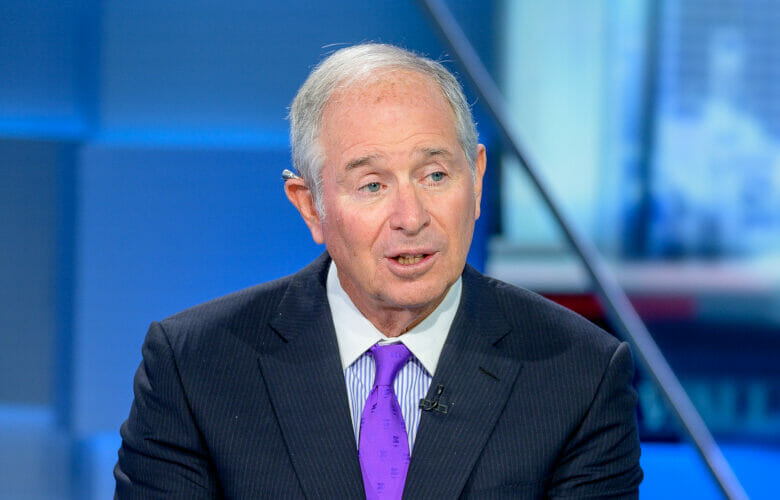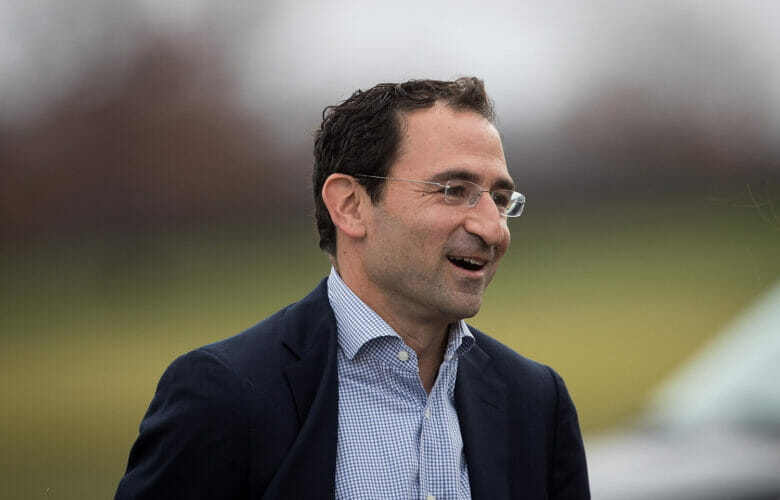
Chairman and CEO Stephen Schwarzman is proud to be Blackstone’s $1 trillion man (Getty Images)
Blackstone on Thursday announced a 39 percent year-on-year drop in distributable earnings to $1.2 billion in the second quarter, but the profit skid was tempered by a 6 percent rise in the private equity giant’s assets under management to an all-time high exceeding $1 trillion.
Fee-earning AUM rose 7 percent year-on-year to $731 billion during the April-June period as invested performance-eligible AUM reached $503.8 billion and undrawn capital available for investment (dry powder) stood at $194.5 billion, the Manhattan-based firm said in its quarterly results.
Chairman and CEO Stephen Schwarzman noted that Blackstone became the first alternative asset manager to surpass the $1 trillion mark, a feat achieved during a rocky first half that saw a surge in redemption requests at the firm’s flagship BREIT property vehicle and a sell-off of some properties.
“This milestone reflects the extraordinary trust we have developed with our investors — built through performance — as well as our distinctive position as an innovator,” said Schwarzman, who co-founded the firm with the late Peter Peterson in 1985. “We believe we are in the early stages of the long-term growth of the alternatives industry, providing a vast opportunity for further expansion.”
Underpenetrated Asia
In Thursday’s earnings presentation, president and chief operating officer Jon Gray highlighted Asia as representing a “significant opportunity” for Blackstone, cutting across the firm’s business lines and distribution channels. Gray characterised the market as “underpenetrated” with respect to alternative investments like real estate.

President and chief operating officer Jon Gray highlighted Blackstone’s large footprint in India (Getty Images)
He called particular attention to India, Blackstone’s third-largest market globally for equity investing (after the US and the UK), where the firm also helped launch the first listed property trust, the 2019-vintage Embassy Office Parks REIT, to trade in the world’s most-populous country. The firm subsequently sponsored Mindspace Business Parks REIT in 2020 and Nexus Select Trust this year, and groundwork is being laid for a $1 billion office REIT IPO.
In Japan — where Blackstone sold a portfolio of six warehouses to Singapore sovereign fund GIC for more than $800 million during the second quarter — the firm sees an opening as corporates sell off non-strategic divisions. China, meanwhile, presents a more challenging environment of economic headwinds and geopolitical issues.
The investment giant has raised nearly $8.2 billion for Blackstone Real Estate Partners Asia III, targeting $9 billion in total equity. The regional opportunistic strategy has deployed nearly $1 billion in capital to date, according to Blackstone’s results.
“Overall, there is substantial runway ahead for our business in Asia,” Gray said Thursday.
BREIT Withdrawals Slow
Turning to the situation at BREIT, where earlier this year Blackstone was compelled to block some investors from cashing out their holdings, Gray said June was the lowest month this year in terms of redemption requests, down nearly 30 percent from the January peak.
BREIT executed the second-quarter sale of the JW Marriott San Antonio Hill Country Resort & Spa for $800 million, which Blackstone said reflected a 22 percent premium to the Texas hotel’s December carrying value and a multiple of 2.2 times invested capital.
In another big-ticket disposal, Blackstone’s private funds offloaded a portfolio of US warehouses to Prologis for $3.1 billion during the second quarter.
“These sales illustrate the exceptional quality and embedded value of our portfolio,” chief financial officer Michael Chae said Thursday. “Stepping back, our model, focused on long-term committed capital, keeps us from being forced sellers when markets are less favourable.”
The second quarter also saw the firm reach the $30.4 billion final closing of its Blackstone Real Estate Partners X fund, making the global strategy the largest-ever closed-end investment vehicle in the real estate or private equity sectors.

Leave a Reply